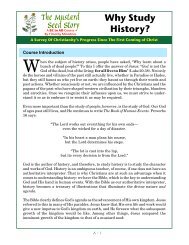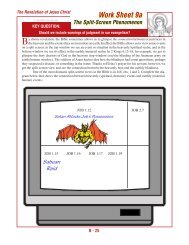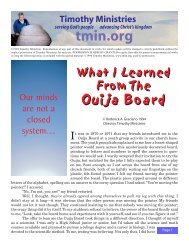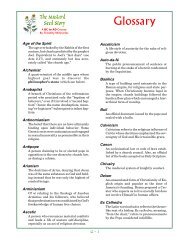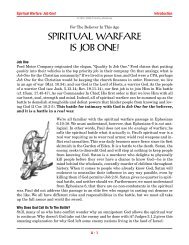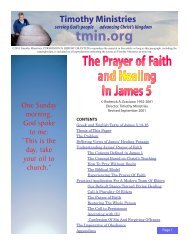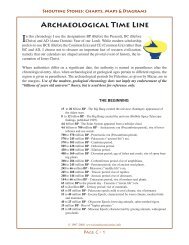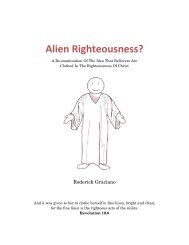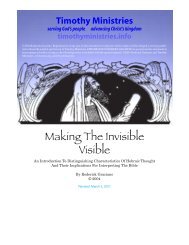Making The Invisible Visible Section 4
Making The Invisible Visible Section 4
Making The Invisible Visible Section 4
You also want an ePaper? Increase the reach of your titles
YUMPU automatically turns print PDFs into web optimized ePapers that Google loves.
Hermeneutics: <strong>Making</strong> <strong>The</strong> <strong>Invisible</strong> <strong>Visible</strong> — © 2004 Roderick Graciano<br />
not to “your eyes,” plural. <strong>The</strong> NIV thought it was absurd and translated, “if your eyes<br />
are good…” But remember how the Hebrews used external traits and bearing (like<br />
the slant at which the Shulammite held her nose) as metaphors for inner qualities?<br />
That’s what Jesus did in this passage about money. <strong>The</strong> expression of the eyes communicates<br />
much about the attitude of a man in the midst of financial dealings. Our<br />
missing hermeneutical insight has been that “a good eye” is a Hebraism for “generosity”!<br />
24 So, single (aplous) does mean sound, healthy and good, but the message is: If<br />
you are generous your whole body (life?) will be full of light.<br />
To Attain To <strong>The</strong> Resurrection… (Phil. 3.10)<br />
<strong>The</strong> Hebraic emphasis on character may also explain the puzzling Pauline wish to<br />
“attain to the resurrection”:<br />
Phil. 3.10 I want to know Christ and the power of his resurrection and the fellowship of sharing in his sufferings,<br />
becoming like him in his death, 11 and so, somehow, to attain to the resurrection from the dead.<br />
Clearly, Paul was not uncertain about whether or not he would be resurrected, for he<br />
preached that there would be “a resurrection of both the righteous and the wicked”<br />
(Acts 24.15). Nor did he endeavor to earn or merit participation in the resurrection<br />
of the righteous, for he intended to “be found in [Christ], not having a righteousness<br />
of my own that comes from the law, but that which is through faith in Christ — the<br />
righteousness that comes from God and is by faith” (Philippians 3.9). No, what Paul<br />
sought was the continuing transformation of his character as he deepened his relationship<br />
with Christ.<br />
Some have wondered if the resurrection Paul referred to in this verse was<br />
something unique since he used a Greek word for it (exanastasis “out-resurrection”)<br />
that occurs nowhere else in the New Testament. <strong>The</strong> normal New Testament word for<br />
resurrection is simply anastasis. However, this should not distract us, for the <strong>The</strong>ological<br />
Dictionary of the New Testament, gleaning from other Greek literature, considers<br />
anastasis and exanastasis equivalent.<br />
<strong>The</strong> key for understanding Philippians 3.11 is the phrase attain to (Gk. katantao<br />
eis). Paul only uses attain (katantao) four times in the canon, and he never uses it or<br />
any other word to speak of “meriting” or “attaining by effort” such a thing as eternal<br />
life or the resurrection. <strong>The</strong> closest parallel in Paul’s writings to the Philippians 3.11<br />
phrasing is in Eph. 4.13:<br />
… until we all attain to the unity of the faith, and of the knowledge of the Son of God, to a mature man, to<br />
the measure of the stature which belongs to the fulness of Christ. (NASB)<br />
Some versions properly render attain to in this Ephesians passage as “reach” (NIV)<br />
or “come to” (NKJV). We see from this parallel, that Paul in Philippians 3.11 is not<br />
speaking of attaining in the sense of getting some reward, but rather in the sense of<br />
arriving at a certain level of maturity. This is clearly the thrust of katantao eis in Eph.<br />
4.13, and it fits the context of Philippians 3. “Not that I have already obtained all this,<br />
or have already been made perfect,” Paul continues in Philippians 3.12, “but I press<br />
on…forgetting what is behind and straining toward what is ahead, I press on toward<br />
the goal…. All of us who are mature should take such a view of things. …Only let us<br />
live up to what we have already attained.” In verse 17, Paul concludes “Join with oth-<br />
Page 17



